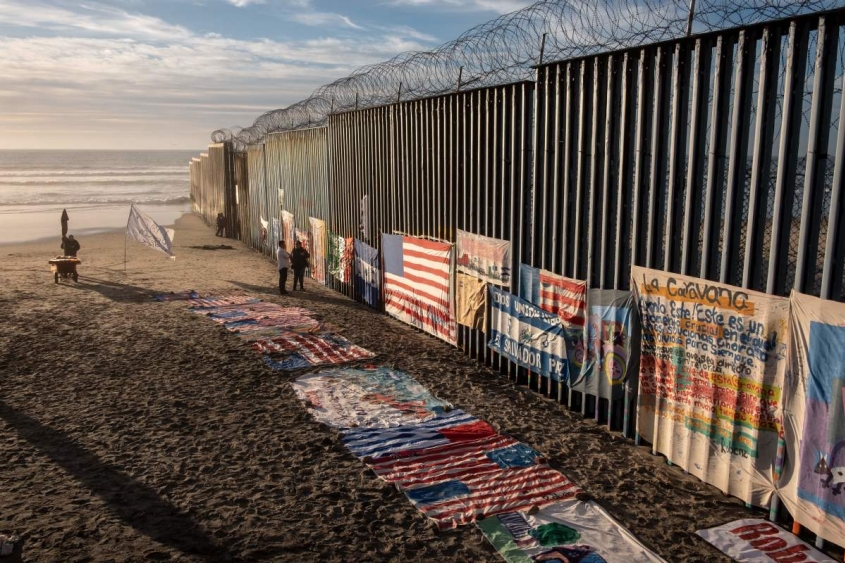Published: 10/13/2020
Image courtesy of Families at the Border.
With unaccompanied minors now being detained in hotels during COVID-19, Global Health Faculty Fellow Dr. Paul Wise is among the few external people with full access to the facilities, detained children, and the agencies responsible for their care.
By Lucas Oliver Oswald.
Today, when a child without U.S. citizenship illegally crosses the U.S. border, a few unusual things happen.
First, the undocumented child is not provided a hearing or legal representation of any kind. Citing efforts to prevent COVID-19 from crossing the U.S. border, the Trump administration has invoked Title 42, a Centers for Disease Control regulation that allows for the expulsion of immigrants coming from across the border without the ordinary legal protections. Adults and families from Mexico and certain Central American countries are sent back to Mexico immediately — approximately 148,000 were expelled between March and September. Unaccompanied children and some families, however, are detained.
Second, in many cases the child is tested for COVID-19. Protocols around testing have changed over time — with Propublica once reporting that test results determined wether children were expelled or detained. Today how the tests are administered or used is unclear.
Third, the child, unless very young, is placed under guard in a hotel room. In the custody of the Immigration and Custom’s Enforcement (ICE), they await flight arangments back to their home countries, meaning they can remain in a hotel room for up to 28 days. According to a July 26th report, minors were being housed in 25 hotels in 3 U.S. states. As part of the Title 42 expulsion protocols, they are generally prevented from accessing legal services.
“We usually think of death as the most horrible thing that can happen. But being separated from their caretaker is the equivalent of death. It is the worst thing that can happen.”
Dr. Victor Carrion, John A. Turner Endowed Professor for Child and Adolescent Psychiatry
Since the onset of the pandemic, at least 577 unaccompanied minors have been detained this way. Stanford professor of pediatrics Dr. Paul H. Wise, who was appointed in July 2019 as a special expert for the U.S. Federal Court overseeing the treatment of migrant children, has been in the midst of the ongoing legal fight regarding the care of children in hotels as well as in all phases of U.S. government detention.
As an external person to the government allowed full access to the facilities, detainees, and certain US immigration data, Dr. Wise plays a critical role providing confidential reports by the U.S. Federal Court. He has spent countless hours interviewing detained children and families to inform these reports.
While Dr. Wise is unable to comment on the case while litigation is ongoing, his reports shed light on what these children and families are experiencing behind closed doors. In recent legal filings the hotel reports have been made public, highlighting concerns for young, unaccompanied children as young as 10 or younger being held in hotels for protracted duration.
His assessment, filed as part of a report by the Independent Monitor, a prominent lawyer Andrea Ordin with whom Dr. Wise works, states, “There remains no assurance that the [hotel housing program] can provide adequate custodial care for single minors, who by definition are being moved through the immigration system alone and without familial support or protection.”
COVID-19 restrictions have generally prevented children from leaving their rooms for recreation but have also exposed them to daily visits from hotel custodial staff.
“One concern is that hotel employees, including maintenance and housekeeping personnel, fall outside [the hotel housing program] monitoring protocols,” one report states.
COVID-19 concerns aside, there can be significant psychological trauma from such isolation.

“The challenge of protecting [unaccompanied children] from COVID-19 only underscores the urgent need to exclude [unaccompanied children] from the temporary housing program,” the report points out. “Certain elements of the protective protocols can have distinct implications for younger children. For example, isolating a child alone in a hotel room for 10- 14 days can have a more harmful emotional impact than that seen in adults.”
Children have drastically different needs for their different age groups, as well as acute vulnerabilities depending on their developmental stage. A major shortcoming of these facilities and protocols is that all children, regardless of their age, are lumped into the same treatment protocols.
“The inclusion of young, single minors in the [hotel housing program] remains of concern. Tender age single minors require specialized supervision and services and are inherently vulnerable to the potential psychological harm of an extended expulsion process. The current [hotel housing program] procedures and amenities make no distinction based on the age or developmental capacity of the child in custody.”
Isolation alone can be devastating for young children. Another Stanford faculty member, professor for child and adolescent psychiatry Dr. Victor Carrion, described the risks of this kind of isolation in a video Stanford Faculty developed to train immigration lawyers to work with children.
“We usually think of death as the most horrible thing that can happen,” says Stanford professor for child and adolescent psychiatry Dr. Victor Carrion, describing the risks of this kind of isolation in a video Stanford Faculty developed to train immigration lawyers to work with children. “It’s what we use as a criterion for PTSD, but young kids don’t understand death. They think it’s reversible… But being separated from their caretaker is the equivalent of death. It is the worst thing that can happen.”
What’s next for these children is unclear. In September, U.S. District Judge Dolly Gee ordered the hotel detention practices to be stopped, saying it violates the humanitarian practices agreed to by US immigration authorities. However, the federal government has appealed to the 9th U.S. Circuit Court of Appeals. The legal status of the hotel program remains unclear for the moment as decisions are expected over the next few weeks.
For now, Dr. Wise and the independent monitor are continuing to monitor the care of children in custody and report their findings to the court.
